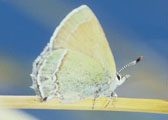Native Plants
Search for native plants by scientific name, common name or family. If you are not sure what you are looking for, try the Combination Search or our Recommended Species lists.
Nolina texana
Nolina texana S. Watson
Texas Sacahuista, Texas Beargrass, Basket Grass, Sacahuista, Bunchgrass, Texas Bear-grass
Liliaceae (Lily Family)
Synonym(s): Nolina affinis, Nolina texana var. compacta
USDA Symbol: NOTE
USDA Native Status: L48 (N)
Texas Bear-grass is a 1 1/2-2 1/2 ft. perennial with large, woody, basal stems growing in a clump. Leaves evergreen, firm textured, long, thin, up to 4 feet long by 3/16 inch wide, forming a thick clump. The roundish leaves often have tiny widely-spaced teeth along portions of the margins. Flowers small, usually white to cream, in dense vertical clusters 10 inches or more long by 2 inches or more wide at the tops of rather short stems, appearing in spring and early summer. Fruit distinctly 3-lobed, a thin-walled capsule 3/16 to 1/4 inch wide. Flowers barely protrude above the foliage.
The name Sacahuista is derived from two Aztec words meaning "thorn grass": zacatl (grass) and huitztli (thorn).
Plant Characteristics
Duration: PerennialHabit: Grass/Grass-like
Leaf Complexity: Simple
Fruit Type: Capsule
Size Notes: Up to about 30 inches tall.
Bloom Information
Bloom Color: White , Pink , Green , PurpleBloom Time: Feb , Mar , Apr , May , Jun
Bloom Notes: White to yellowish green, sometimes pinkish or purplish.
Distribution
USA: AZ , CO , NM , OK , TXNative Distribution: C. TX to upper Rio Grande Plains & Trans-Pecos, w. to s.e. AZ
Native Habitat: Woods openings & borders. West Texas and South Texas. Rocky soils.
Growing Conditions
Water Use: LowLight Requirement: Part Shade
Soil Moisture: Dry
Cold Tolerant: yes
Heat Tolerant: yes
Soil Description: Rocky soils. Rocky, Limestone-based, Sandy, Sandy Loam, Medium Loam, Clay Loam, Clay, Caliche type
Conditions Comments: Not a true grass, but a member of the lily family. A graceful, evergreen garden accent complements almost any other plant and provides texture and structure in winter. Looks great flowing over a wall or hillside. Slow-growing but hardy and low maintenance. The long, strong, smooth, and fibrous leaves have been used in basket making. Drought-tolerant.
Benefit
Use Ornamental: Accent tree or shrub, Winter-hardy, Rocky hillsideUse Wildlife: Nectar-insects, Cover.
Conspicuous Flowers: yes
Interesting Foliage: yes
Attracts: Butterflies
Larval Host: Sandia hairstreak butterfly.
Deer Resistant: High
Butterflies and Moths of North America (BAMONA)
|
Sandia Hairstreak (Callophrys mcfarlandi)  Larval Host |
Propagation
Propagation Material: SeedsDescription: Take individual offshoots from mature plants in winter. Plant seeds in cold frame or greenhouse in late January (cool weather). Seedlings do best if transplanted into 4-6 inch pots and given light shade the first season.
Seed Collection: Collect seeds when pod or capsule begins to dry. Spread seeds in thin layer and dry at room temperature. Store in sealed, refrigerated containers from up to one year.
Commercially Avail: yes
Find Seed or Plants
Order seed of this species from Native American Seed and help support the Wildflower Center.
Mr. Smarty Plants says
Small shrub to plant in Austin Texas
March 11, 2009
Hi..
I live in Southwest Austin and I am looking for a shrub that I can plant against the back of my house, which faces the north. I want something native, fairly low maintenance and not too large,...
view the full question and answer
Native plants for container gardens in Central Texas
March 11, 2008
Dear Mr. Smarty Plants: I moved to TX last year, for now living in an apartment with a good-size but shady deck; my garden in VA was full of VA native plants. What TX natives, if any, can I grow in ...
view the full question and answer
Erosion control plants for steep slope in Austin, TX
April 09, 2007
I'm interested in finding native plants, either perennials or grasses, that would help control erosion on a fairly steep slope. These plants would be in a park, and volunteers will be watering the pl...
view the full question and answer
From the National Organizations Directory
According to the species list provided by Affiliate Organizations, this plant is on display at the following locations:Fredericksburg Nature Center - Fredericksburg, TX
Lady Bird Johnson Wildflower Center - Austin, TX
Sibley Nature Center - Midland, TX
NPSOT - Fredericksburg Chapter - Fredericksburg, TX
NPSOT - Austin Chapter - Austin, TX
NPSOT - Williamson County Chapter - Georgetown, TX
Bibliography
Bibref 1186 - Field Guide to Moths of Eastern North America (2005) Covell, C.V., Jr.Bibref 1185 - Field Guide to Western Butterflies (Peterson Field Guides) (1999) Opler, P.A. and A.B. Wright
Bibref 355 - Landscaping with Native Plants of Texas and the Southwest (1991) Miller, G. O.
Bibref 354 - Native & Naturalized Woody Plants of Austin & the Hill Country (1981) Lynch, D.
Bibref 995 - Native Landscaping from El Paso to L.A. (2000) Wasowski, S. and A. Wasowski
Bibref 318 - Native Texas Plants: Landscaping Region by Region (2002) Wasowski, S. & A. Wasowski
Bibref 291 - Texas Wildscapes: Gardening for Wildlife (1999) Damude, N. & K.C. Bender
Search More Titles in Bibliography
Web Reference
Webref 38 - Flora of North America (2019) Missouri Botanical Garden, St. Louis, MO & Harvard University Herbaria, Cambridge, MA.Webref 23 - Southwest Environmental Information Network (2009) SEINet - Arizona Chapter
Additional resources
USDA: Find Nolina texana in USDA PlantsFNA: Find Nolina texana in the Flora of North America (if available)
Google: Search Google for Nolina texana
Metadata
Record Modified: 2023-02-20Research By: TWC Staff, LAL, MAC